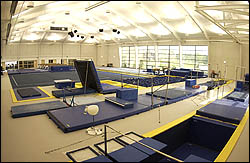 The
22,000-square-foot facility, made possible by a $3.5
million gift from Shepherd, a Michigan alumnus, is the
new practice and training home of the Wolverines. The
state-of-the-art complex has 17,000 square feet of training
area which is outfitted with the latest in gymnastics
training equipment, including resi- and free-foam pits
at each event. There is an additional 5,000 square feet
which houses a training room, offices for the coaching
staff, a locker room, a team lounge, and a study area
for the student-athletes. The
22,000-square-foot facility, made possible by a $3.5
million gift from Shepherd, a Michigan alumnus, is the
new practice and training home of the Wolverines. The
state-of-the-art complex has 17,000 square feet of training
area which is outfitted with the latest in gymnastics
training equipment, including resi- and free-foam pits
at each event. There is an additional 5,000 square feet
which houses a training room, offices for the coaching
staff, a locker room, a team lounge, and a study area
for the student-athletes.
WOLVERINE
DREAM:
Thanks to a generous donor, the Michigan Women's Gymnastics
Team is practicing in paradise
By Jessica Steyers (circa 2002)
Walking from the entrance to the floor
exercise area in the University of Michigan's old women's
practice facility carried a high degree of difficulty.
One wrong step and you could get hurt. The safest path
followed the edge of the beam dismount mats, a balancing
act itself. Veer off the mats and you're in the path
of an oncoming vaulter. Step too far onto the mats and
you could get clobbered by a beam dismount. And that's
before you even got to the uneven bars and tumbl-trak.
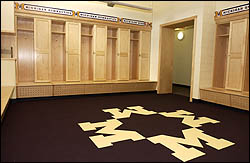 Those
weren't the only traffic hazards in the Sports Coliseum.
The gym had two resi-pits: one for vault, the other
for bars, beam and tumbling. The latter could handle
one gymnast at a time. If you fell off one beam, it
was possible to jump onto a nearby trampoline. Then
there's assistant coach Scott Sherman, the team's primary
spotter, who logged many miles running back and forth
across the gym to spot every landing. Those
weren't the only traffic hazards in the Sports Coliseum.
The gym had two resi-pits: one for vault, the other
for bars, beam and tumbling. The latter could handle
one gymnast at a time. If you fell off one beam, it
was possible to jump onto a nearby trampoline. Then
there's assistant coach Scott Sherman, the team's primary
spotter, who logged many miles running back and forth
across the gym to spot every landing.
When Michigan alumnus Donald Shepherd
visited the Coliseum back in 1999, his first thought
was, "Gosh, you're a bit cramped in here."
"Well, it's not ideally what
we would like," Head Coach Beverly Plocki told
him. "But we make it work."
The Coliseum had been renovated once
since Plocki's arrival to the Ann Arbor campus in 1990.
Along with adding resi-pits, a permanent wall was installed
to replace an old green curtain that separated the gymnastics
equipment from basketball courts. Finally, the facility
was comparable to others across the country. But not
for long.
In 1992, Oregon State received a donation
to renovate its practice facility, which started a chain
reaction across the country. "It was all the buzz
that Oregon State's facility was so beautiful,"
Plocki says. "Then Alabama built one, Georgia,
West Virginia, Auburn, everyone."
 Everyone
but Michigan. Within a few years, Plocki's 7,000-square-foot
gym paled in comparison. She tried to gain support of
the athletic department, but it wasn't easy. "If
you're not moving forward you're falling behind, and
that's the concept I tried to get across to the athletic
department," she says. She eventually fought her
way onto a list of new facilities promised by the athletic
department. Then administrative shifts changed the department's
priorities. A new women's gymnastics facility was bumped
in favor of other projects; Plocki was back to square
one. "I still think that we would be absolutely
nowhere, back in the Sports Coliseum," she says,
"if it hadn't been for Donald Shepherd stepping
up and saying, 'This is important to me. I want it done,
and I'm going to pay for it.'" Everyone
but Michigan. Within a few years, Plocki's 7,000-square-foot
gym paled in comparison. She tried to gain support of
the athletic department, but it wasn't easy. "If
you're not moving forward you're falling behind, and
that's the concept I tried to get across to the athletic
department," she says. She eventually fought her
way onto a list of new facilities promised by the athletic
department. Then administrative shifts changed the department's
priorities. A new women's gymnastics facility was bumped
in favor of other projects; Plocki was back to square
one. "I still think that we would be absolutely
nowhere, back in the Sports Coliseum," she says,
"if it hadn't been for Donald Shepherd stepping
up and saying, 'This is important to me. I want it done,
and I'm going to pay for it.'"
Shepherd, a Michigan business school
alum who retired as CEO of a successful money management
firm, first met Plocki at an athletic department development
dinner in the mid-1990s. Their early conversations were
casual and cordial, consisting mostly of small talk.
In the summer of 1998, the pair met for lunch-and what
both agree was a deliciously sinful ice cream dessert-near
Shepherd's home in Southern California. Unbeknownst
to Plocki, Shepherd was planning to endow another scholarship,
and women's gymnastics was on his list of considerations.
At the time, Shepherd endowed five
athletic scholarships at Michigan-softball, tennis,
field hockey, golf and volleyball. He also investigates
each program before he makes a commitment. "My
support is based a lot upon the people who are on the
teams and my assessment of them as individuals,"
he says. "[Women's] gymnastics has good students
who I enjoy watching."
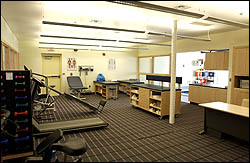 It
didn't take long for Shepherd to be sold on the program.
"We talked a lot about what her ideals were,"
he said. "I put a lot of weight and emphasis on
what I think the coach's values are. I just had a really
good feeling that she likes the athletes and is working
on their behalf, and not using them to accomplish something
for herself." It
didn't take long for Shepherd to be sold on the program.
"We talked a lot about what her ideals were,"
he said. "I put a lot of weight and emphasis on
what I think the coach's values are. I just had a really
good feeling that she likes the athletes and is working
on their behalf, and not using them to accomplish something
for herself."
Shepherd actually endowed the first
football scholarship on campus, but has since shied
away from revenue sports, frustrated with the lack of
personal contact.
A few days after Plocki returned
from her visit with Shepherd, she received an e-mail
stating, "Congratulations, Don Shepherd has chosen
women's gymnastics as one of his next endowed scholarships."
Astonished and flattered, Plocki over-nighted a thank-you
package to Shepherd, including an autographed poster
(which still hangs on his wall at home), some Michigan
gymnastics apparel (which he proudly wears) and a card
signed by all the team members, inviting Shepherd to
accompany the team to NCAA championships (he attends
every year). The next day, Shepherd called Plocki and
accepted the invitation.
Shepherd had a blast on the trip.
"Just the fact that I was included in virtually
everything they did made a difference," he says.
"If they just treated me as 'this guy over there,'
there wouldn't be a new facility."
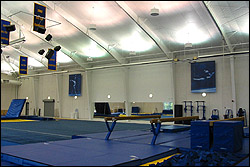 Shepherd
attended the competition with Katy Nellans, who was
injured at the time. Nellans explained the sport's intricacies
to Shepherd, who was eager to learn. "I still don't
know how the judges really score," he admits. "I
don't know what to look for or the names of the moves." Shepherd
attended the competition with Katy Nellans, who was
injured at the time. Nellans explained the sport's intricacies
to Shepherd, who was eager to learn. "I still don't
know how the judges really score," he admits. "I
don't know what to look for or the names of the moves."
Following the NCAA banquet, the entire
team visited Utah's training facility. Shepherd was
in awe of its natural light and space, but was struck
the most by the Wolverines' reactions. "They had
come in with banquet clothes on, all dressed up, but
they immediately made a beeline for the trampolines,"
he recalls. "I just remember how excited they were,
... "I immediately saw it and thought, Michigan
needs one of these."
Shepherd waited until that evening
to break the news. Seated at a table in Marie Callender's
restaurant with Plocki and her husband, Shepherd leaned
over his cup of coffee and said he'd put up one million
dollars toward the cost of a new facility. "My
jaw just dropped on the table," Plocki says. "What
do you say to someone who offers to give you one million
dollars? Tears started welling up in my eyes and Don
kept saying, 'Don't you cry. If you start crying I'm
going to cry.'"
Three years after that fateful dinner,
the team moved into the Donald R. Shepherd gymnastics
training center. (The men's team moved into the Coliseum,
which was renovated.) The gym boasts 17,000 square feet
of gym space, with 6,000 square feet of offices, locker
rooms, a team lounge and a state-of-the-art training
room. The biggest contrast to the old gym is the amount
of natural light that pours through huge windows on
two sides of the building. "At my home I have 12
skylights," Shepherd says. "I function better
in a bright environment, so I wanted natural light coming
in."
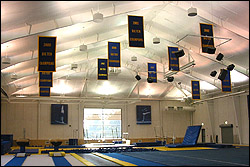 The
interior of the gym is unique in terms of safety and
functionality. At every event, gymnasts can land on
three different kinds of surfaces: competition, resi-pit
and free-foam pit. The floor exercise area includes
a full floor with the option of tumbling onto resi-pits,
as well as a tumbling strip, rod floor, and in-ground
tumble-trak. All lead to both resi- and free-foam pits.
Three vault runways are atop a basketball-style floor,
not concrete, to ease stress on the body. The
interior of the gym is unique in terms of safety and
functionality. At every event, gymnasts can land on
three different kinds of surfaces: competition, resi-pit
and free-foam pit. The floor exercise area includes
a full floor with the option of tumbling onto resi-pits,
as well as a tumbling strip, rod floor, and in-ground
tumble-trak. All lead to both resi- and free-foam pits.
Three vault runways are atop a basketball-style floor,
not concrete, to ease stress on the body.
The total price tag, funded by Shepherd,
was $3.5 million. "The whole focus of this new
training facility is not only to increase skills,"
Plocki explains, "but to reduce the amount of overuse
injuries that are so prevalent in gymnastics. We're
hoping that by having a variety of surfaces to land
in and take off from, that this will help."
Along with injury prevention, the
gym has aided in the comeback efforts of sophomores
Lauren Mirkovich and Erica Rubin. Both underwent ACL
repairs last winter and are training competitive dismounts,
vaults and tumbling passes into the free-foam pits.
Having pits has also changed the team's
training plan. "We've purposely held off on requiring
the athletes to land on the real floor because we're
pushing for upgrades," assistant coach Joanne Bowers
says. "A lot of them are really close to having
something ready."
Plocki always felt that Michigan
had everything to offer except a quality facility, which
put her at a disadvantage recruiting-wise. Now she can
finally offer the complete package. "Recruits walk
into the gym and can't believe such a place exists,"
she says.
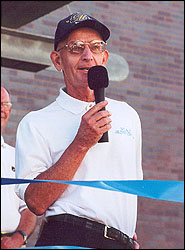 After
coming within tenths of national titles in 1995, 1999
and 2001, Plocki is appreciative of Shepherd's belief
that there's more to success than a competition result.
"Sometimes the nice guy doesn't always seem to
finish first, and it does get frustrating when you feel
like you're trying to do things the right way and you
don't come out the way you think they should,"
she says. "But there are people out there like
Don Shepherd who will recognize that and appreciate
it. He made this dream come true for me." After
coming within tenths of national titles in 1995, 1999
and 2001, Plocki is appreciative of Shepherd's belief
that there's more to success than a competition result.
"Sometimes the nice guy doesn't always seem to
finish first, and it does get frustrating when you feel
like you're trying to do things the right way and you
don't come out the way you think they should,"
she says. "But there are people out there like
Don Shepherd who will recognize that and appreciate
it. He made this dream come true for me."
Michigan junior Jessica Steyers,
a former gymnast, is the women's gymnastics team student
manager.
Reprinted with permission from
International
Gymnast Magazine Online.
|
